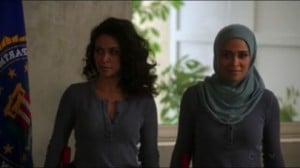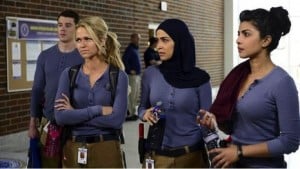“This is the true story of seven strangers, picked to live in a house, work together and have their lives taped, to find out what happens when people stop being polite and start getting real.”
Those words have forever ushered in MTV’s “real” drama-filled saga, The Real World. The Real World has long been known for its token cast members: in an all-white, heterosexual cast, MTV would often cast one or two people of color and/or from the LGBTQ community, ostensibly to heighten tensions and increase ratings.
Season 19 of the Real World saga, set in Sydney, Australia, offered viewers a new entrée to salivate over: “the Muslim woman.” Parisa, an American-Iranian woman, was the first Muslim to appear on The Real World. She was the only person of color that season, and replaced both the token gay and black cast members. I guess they thought one Muslim woman was enough to conjure up the drama the other two token characters promised.
Wendi Muse at Racialicious put it best, saying:
“Maybe they felt like throwing a brown Muslim girl into the vanilla pot would liven it up a little, but honestly, I feel like this is MTV’s as-per-usual approach to diversity: do something controversial, put the people (or person, in this case) of color in an awkward position that makes them react in an outrageous, albeit usually justified, way, then sit back and watch the ratings go up.”
The show had not aired at this point, but Wendi’s predictions were right. The season’s most memorable moment was when fellow cast member Trisha pushed Parisa in a fit of rage. Drama had been brewing between the two cast members since the first episode, and eventually led to Trisha’s horrifying outburst.
The final showdown had been catalyzed by a number of things: Trisha’s constant reminder that she was always speaking “as a Christian” and her prejudiced rant as she recounts how she shouted at a McDonald’s employee to take “F**king English lessons,” which did not sit well with Parisa, the daughter of immigrant parents.
However, Trisha’s final vicious display of physical violence did not elicit the reaction from Parisa that MTV had hoped for. She kept her cool, instead calling producers to ask Trisha to leave the show. The sought-after fight between the Christian and the Muslim did not pan out the way viewers had hoped.
As if the situation in the house was not awkward enough, Parisa has said that producers wanted footage of her praying to emphasize her Muslim background. Her bio on MTV’s web site claimed she came from a conservative religious home, but she says, “I don’t have a conservative Muslim family.”
It’s no wonder why they thought bringing in a Muslim cast member in the post-9/11 climate would cause ratings to go up. However, I wondered, why a woman? Was a Muslim woman seen as more susceptible to the pressures of drinking, promiscuity and partying? Or was it the opposite: that a Muslim woman would perhaps be less susceptible to pressures, creating more drama between her and the other house mates?
Were casting directors feeding into the idea of a Muslim woman as a symbol of honor and religion and waiting, like a pack of wolves, for her to fail miserably in upholding both, so they could air out her dirty laundry to millions of viewers across the globe?
This season of Real World—set in New Orleans—has me asking myself the same questions. Again, a Muslim woman is cast. This time, they left in the token gay cast member. Maybe Parisa was not enough drama?
Sahar is an American-Muslim woman from Dearborn, Michigan. Her tattooed arm, facial piercings, and moderate drinking suggest that she does not fit the mold of the demure, submissive Muslim woman that they had tried to cast Parisa as. So does her MTV bio, which reads:
“Sahar grew up in a conservative Arab community in Dearborn, MI. It would be easy to assume that because of that she’s a submissive, conservative girl. But that would not be the case. She’s a strong-willed, liberal Muslim who is not easily intimidated. Expect her to speak her mind. Sahar was fortunate to have parents who allowed her a bit more space to be herself; however, there are still things that she was forced to hide from her community, like her virginity… or lack thereof.”
Below is a promo clip for this TRW season: (Note: there is graphic language in the MTV clip.)
How’s that for stereotyping?
Only four episodes have aired in this season, but Sahar seems to be laying low and staying out of the limelight, making appearances mainly to smooch on the cast’s “dreamiest” male member, Eric, and to be the voice of reason among the sex-crazed and boozing cast members. When the roomies talk about sex and drugs, Sahar either has avoided talking or producers have cut it out.
So far, one of the only times her Muslim background is mentioned by other cast mates is when Eric asks Sahar if her “Moslum” parents mind that she has a promising relationship back home with a Catholic boy, to which she replies no.
I don’t know what tricks MTV has up their sleeves, what crazy secrets will be revealed later, or what awkward social situations will be created, but Sahar does not seem to be the drama MTV is looking for. For now, viewers will have to be content with the drama drummed up by the other cast members.














